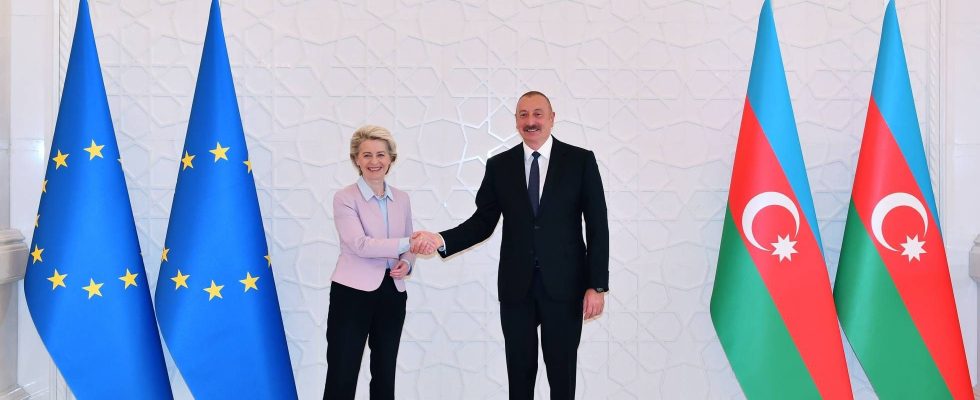“And you are surprised that the Armenians, who are the dupes or the victims of this European intrigue, of this breach of the European word, go to the capitals, to Paris, to London, to try to arouse a little pity, ‘attention from Europe!’ These words were not spoken this fall, after Azerbaijan’s attack on the Armenian enclave of Nagorno-Karabakh which forced almost its entire population, or 120,000 people, into exile. They resonated on November 3, 1896, when Jean Jaurès, denouncing the start of a “war of extermination”, alerted the Chamber of Deputies to the terrible threat weighing on the Armenian people. Twenty years later, the facts prove him right: the genocide perpetrated by the Ottoman Empire will cause more than a million victims. Today, these people are in danger again, under the indifferent gaze of Europe. Will Armenia’s torment ever end?
The self-proclaimed Republic of Nagorno-Karabakh, established on land inhabited by Armenians for centuries – but offered by Stalin to the socialist republic of Azerbaijan in 1921 – disappeared overnight, after the offensive by Baku’s forces , this September 19. Soon, this territory, which had been asphyxiated by nine months of blockade, will be entirely emptied of its Armenian population and the traces of its culture will probably be erased. We are already talking about “ethnic cleansing”.
Visiting the Azerbaijani enclave of Nakhichevan, Turkish President Recep Tayyip Erdogan welcomed the “victory” of his Azerbaijani counterpart, Ilham Aliev, citing a “cause for pride for Turkey”. Already, the two friends dream of annexing the Armenian corridor of Zangezur, along the border with Iran, which would allow Baku to establish territorial continuity with Ankara. In Yerevan, fears of an Azerbaijani attack on the more vulnerable south of Armenia – a country that has been steadily being cut off for decades – are growing.
Lack of political will
While survivors of the 1915 genocide relive an eternal nightmare, Europe is once again looking elsewhere. Some will say that she cannot be on all fronts, at a time when her support for Ukraine is becoming more difficult to get the population to accept. Is this a reason not to act? No ! Like Vladimir Putin, the Azerbaijani autocrat must realize that he cannot use force with impunity. That there will be a cost to pay.
But what to do ? “The European Union could put pressure on Baku, but there is a glaring lack of political will,” notes Anita Khachaturova, researcher at the Free University of Belgium. Europe would be paralyzed by its gas contracts with Azerbaijan. Let’s recall the context: in June 2022, Moscow will cut off gas to Europeans. Panic in Brussels, supplies must be diversified. On July 18, 2022, Ursula von der Leyen, the President of the European Commission, signed an ambitious agreement in Baku, which consists of doubling Azerbaijani gas imports “in a few years”, which would make the Twenty-Seven the first customers of Baku. A “deal” contested at the time by around sixty French parliamentarians from all sides: is it reasonable to put oneself in the hands of such an autocrat?
blank check
Probably not, “especially since this gas comes partly from Russia, argues Anita Khachaturova. Azerbaijan does not have the capacity to produce such volumes on its own.” These dilemmas hardly embarrass von der Leyen: “You are a crucial energy partner for us and you have always been reliable,” she says to a beaming Aliev. For the dictator, these words resonate like a blank check. Five months later, the blockade begins. Nothing will stop him, not even the International Court of Justice which, on February 22, 2023, ordered Baku to end the blockade of the Lachin corridor, the umbilical cord which linked Armenia to the enclave of Nagorno-Karabakh . “Aliev understood that no one would oppose him,” summarizes Benyamin Poghosyan, researcher at the Apri Armenia think tank.
The complex question of sanctions therefore arises. Turn off the pipeline valve? If Azerbaijani gas only represents a small percentage of European imports, its recipients (Hungary, Bulgaria, Italy) would nonetheless veto it. But other options are possible. For example, “freezing the funds of Aliyev and his family, deposited abroad, which number in billions of dollars, as revealed by the Panama Papers, suggests this researcher. There would be no need to go through a vote…”
Here again, the path is narrow, the EU not wishing to undermine Turkey, Baku’s unwavering support and a member of NATO. Acting is no less essential to put an end to Aliyev’s impunity. And help Armenia preserve its sovereignty on all fronts, including security. Wouldn’t it be time to listen to Jaurès?
